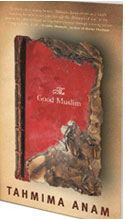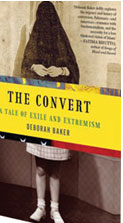| Books and Documents | |
| 25 Jun 2011, NewAgeIslam.Com |
What is it about burqa-clad/veiled Muslim women that get so many people’s goats? | ||

Two new books set in the South Asian subcontinent focus on female Muslim characters and Islam. The Convert is a well-researched and intriguing narrative of one Maryam Jameelah’s life by acclaimed biographer Deborah Baker. The Good Muslim is a beautiful novel by Tahmima Anam set in the turmoil of post-Independence Bangladesh. Despite their chalk-and-cheese appearance, a few commonalities that struck my reading as a young Muslimah with a decent grasp of my religion. We like our share of laughs, our silly and often risqué jokes, our music, our sports, our books. What is it about burqa-clad/veiled Muslim women that get so many people’s goats? Such condescension, such disdain! Especially from women, and surprisingly to me, from Muslim women who choose not to wear the veil.
I don’t hold it against you that you don’t want to wear something — why must you hold it against us if we do? Or rather — and this is what I’m getting at — what gives anyone the right? -- Sabbah Haji
| ||
| What is it about burqa-clad/veiled Muslim women that get so many people’s goats? | |
By Sabbah Haji
Sabbah Haji often wondered why burqa-clad women get people’s goats. Two new books provide some hints
ONE OF the Quran’s most endearing lines for me is verse 2:256: “There is no compulsion in religion.” I take this to mean “I can’t impose my religious will on you, and you will kindly return the favour.” Note that it works both ways — it tells hardliners not to enforce their strict, often unreasonable rules, on others; and it tells the other extreme not to enforce their idea of ‘okay’ on those who choose a conservative way of life. No compulsion either way. Unfortunately, this isn’t how it is in real life, and we often see it reflected in literature.
Two new books set in the South Asian subcontinent focus on female Muslim characters and Islam. The Convert is a well-researched and intriguing narrative of one Maryam Jameelah’s life by acclaimed biographer Deborah Baker. The Good Muslim is a beautiful novel by Tahmima Anam set in the turmoil of post-Independence Bangladesh. Despite their chalk-and-cheese appearance, a few commonalities that struck my reading as a young Muslimah with a decent grasp of my religion.
 My first impression of The Convert was based on its cover: a woman in full black burqa and a title subheader that announces “A Tale of Exile and Extremism”, jostling with a typically dramatic blurb by Fatima Bhutto bemoaning fundamentalism in Islam. So far, so bad. Happily, the writing inside turned out to be a balanced, fascinating story of Maryam Jameelah, a Jewish-American who grew up in a strongly Zionist post- WWII New York. She embraced the strictest version of Islam as a young lady and moved to Pakistan under the guardianship of Maulana Abul Aa’la Al Mawdudi, founder of the Jamaat-e-Islaami and considered the intellectual founding father of militant Islam. My first impression of The Convert was based on its cover: a woman in full black burqa and a title subheader that announces “A Tale of Exile and Extremism”, jostling with a typically dramatic blurb by Fatima Bhutto bemoaning fundamentalism in Islam. So far, so bad. Happily, the writing inside turned out to be a balanced, fascinating story of Maryam Jameelah, a Jewish-American who grew up in a strongly Zionist post- WWII New York. She embraced the strictest version of Islam as a young lady and moved to Pakistan under the guardianship of Maulana Abul Aa’la Al Mawdudi, founder of the Jamaat-e-Islaami and considered the intellectual founding father of militant Islam.
The Convert is told to us through a series of letters and correspondence between Jameelah, her family and Maulana Maudoodi, interspersed with Baker’s thoughts at the time of reading and her narration. Hers is an incredible tale I somehow can’t wrap my head around. It is hard to understand how she took such a leap of faith — why she opted for such a complete change of life, religion, culture and geography — with merely the support of an as yet unknown scholar halfway across the world. There are also revelations about Jameelah through the book that leave one feeling sceptical about her, particularly her history of mental disturbances and the fact that she rewrote her correspondence at a later date. The Convert is as much about Maulana Mawdudi as about Maryam Jameelah, though it does take you inside her conservative Islamic life in Pakistan.
 The Good Muslim is the story of Maya and her brother Sohail in post-War Bangladesh, where the latter’s conversion towards a radical Islam creates turmoil and conflict in their relationship. The Good Muslim is the story of Maya and her brother Sohail in post-War Bangladesh, where the latter’s conversion towards a radical Islam creates turmoil and conflict in their relationship.
Both books are excellent reads. Where Baker is an outsider looking into a strange world of orthodox Islam, Anam brings a personal view of the world she describes. What immediately struck me was a feeling of some sadness at the revealed truth in both works — that Islam as it should be, and Islam as it is, are two different things, that religion has been hijacked by the narrow, often baseless interpretations of a few ‘scholars’ or those deemed ‘religious people’.
THE OTHER point I noticed in these books was their slight puzzlement at conservative Islam. Both Maryam Jameelah and Sohail go the whole hog of Islamic convention. Maryam opts for complete seclusion, full burqa and no physical contact with the outside world. Sohail begins with a change to “the garb of the faithful” and eventually moves to the strictest interpretation of Islamic lifestyle and a severance with family and friends. In both cases, the author/narrator’s reaction is perplexed: why this change? How can anyone think and choose this voluntarily?
The Convert: A Tale Of Exile And Extremism Deborah Baker Penguin 256; Rs 450
The Good Muslim Tahmima Anam Penguin 304 pp; Rs 499
This then is my grouse. While I may not agree with many points of someone else’s religious practices, I must always understand that it is after all their personal choice and I cannot compel them otherwise. Non-religious, liberal voices have a particularly self-righteous way of holding up the faithful to scrutiny. Why? In your minds, are you better than us for the choices we make inside our hijabs and burqas and with our long beards and short trousers? Is it my clothes that bother you, my overt display of my religion? Or does it peg me in your mind as someone that thinks a certain dhakyanoosi way?
Maya in The Good Muslim is clearly outraged at her brother’s ‘Islamisation’. She despises any show of religiousness; she has a spat with a vegetable vendor who replies ‘Allah Hafiz’ instead of ‘Khuda Hafiz’. In the novel, we see a possible justification for her feeling this way (the horrors of the Bangladesh war for independence are telling), but even so it irks. Other characters are also depicted realistically, always ready to mock religion. I see this attitude online every day in well-read, well-educated people.
What is it about burqa-clad/veiled Muslim women that gets so many people’s goats? Such condescension, such disdain! Especially from women, and surprisingly to me, from Muslim women who choose not to wear the veil. Muslimahs who actually choose to wear the hijab or burqa — like myself and the many I’ve interacted with in real life and online — are like regular girls. We like our share of laughs, our silly and often risqué jokes, our music, our sports, our books. I don’t hold it against you that you don’t want to wear something — why must you hold it against us if we do? Or rather — and this is what I’m getting at — what gives anyone the right?
There is no compulsion in religion, and extremism either way is distasteful.
Haji is a writer and works with Haji Amina Trust in J&K
Source: Tehelka.com
|




 Moderate Islamist here
Moderate Islamist here


0 comments:
Post a Comment